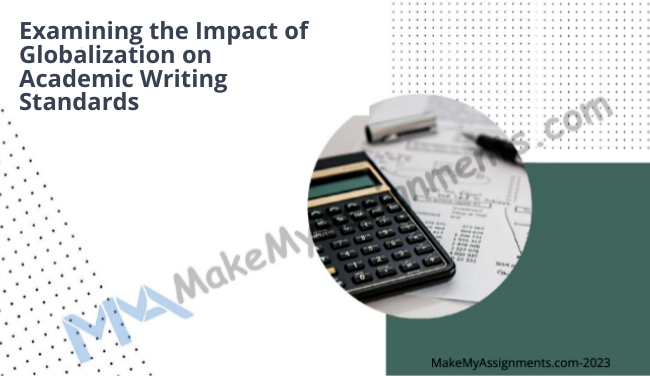
Examining the Impact of Globalization on Academic Writing Standards
In the current era of rapid globalization, the world is witnessing an unprecedented exchange of ideas, cultures, and information across borders. One domain significantly affected by this phenomenon is academic writing. As global interactions intensify, the standards and norms in academic writing are experiencing notable shifts. This article aims to delve into the multifaceted impact of globalization on academic writing standards, highlighting the changes, challenges, and opportunities it presents in various educational contexts worldwide.

Evolution of Academic Writing in a Globalized World
Globalization has brought about an undeniable transformation in the landscape of academic writing. With the dissemination of knowledge across diverse cultures, academic writing has become more inclusive and accessible. Traditional academic writing norms have been influenced by diverse linguistic and cultural perspectives, resulting in a broader acceptance of varied writing styles and approaches. This shift has led to the incorporation of multicultural elements into academic discourse, fostering a more comprehensive and dynamic exchange of ideas. Consequently, academic writing has become more vibrant, reflecting a mosaic of cultural expressions and diverse viewpoints, contributing to the enrichment and global dissemination of knowledge.
Challenges in Maintaining Uniform Standards
While globalization has expanded the horizons of academic writing, it has also posed challenges in maintaining uniform writing standards. With the inclusion of diverse linguistic and cultural influences, the standardization of academic writing has become a complex task. Educational institutions are faced with the challenge of balancing the need for inclusivity with the preservation of established writing conventions. This challenge is particularly pertinent in international academic collaborations, where differing writing styles and norms often collide, leading to discrepancies in evaluating the quality of academic work. Moreover, the interpretation of plagiarism and citation practices varies across different cultural and educational contexts, necessitating a nuanced understanding of academic integrity and ethical writing practices on a global scale.
Impact on Language and Communication
The impact of globalization on academic writing standards is particularly evident in the realm of language and communication. As English continues to dominate as the lingua franca of academic communication, there is a growing emphasis on enhancing language proficiency among non-native English speakers. The demand for English language proficiency has led to the establishment of specialized language programs and writing support services in academic institutions, catering to the diverse linguistic needs of students and scholars. Furthermore, the incorporation of local languages and dialects in academic discourse has become more prevalent, reflecting the need to accommodate diverse cultural expressions in scholarly writing. However, this integration of diverse linguistic elements necessitates a careful balance between preserving linguistic authenticity and adhering to universally accepted academic language standards, thereby highlighting the importance of promoting multilingualism and cross-cultural communication in the global academic landscape.
Technology and the Shaping of Academic Writing
The digital revolution, facilitated by the globalization of technology, has significantly influenced the standards and practices of academic writing. The emergence of online academic platforms, digital libraries, and collaborative writing tools has revolutionized the accessibility and dissemination of academic knowledge. Researchers and scholars can now engage in collaborative writing projects, virtual conferences, and interdisciplinary research endeavors, transcending geographical boundaries and fostering a culture of global academic collaboration. Furthermore, the prevalence of online research resources has broadened the scope of academic writing, enabling researchers and scholars to access a wealth of information across various disciplines and geographical boundaries. However, this increased accessibility has also led to concerns regarding the credibility and reliability of online sources, emphasizing the need for critical evaluation and discernment in academic research and writing. Moreover, the integration of digital tools and software in academic writing practices has reshaped the formatting and presentation standards, necessitating a comprehensive understanding of digital literacy and technological competence in contemporary academic writing.
Promoting Cultural Diversity and Inclusivity
Amidst the evolving landscape of academic writing standards, there is a growing emphasis on promoting cultural diversity and inclusivity. Globalization has encouraged the integration of diverse cultural perspectives and narratives in academic writing, fostering a more comprehensive understanding of complex social, political, and historical issues. By embracing diverse voices and perspectives, academic institutions are fostering an environment that encourages critical thinking and intercultural dialogue, enriching the overall academic discourse and promoting a more holistic approach to knowledge creation and dissemination. Furthermore, the integration of cross-cultural research methodologies and interdisciplinary approaches has paved the way for a more nuanced understanding of global issues, promoting empathy and cultural awareness among scholars and students worldwide. Educational institutions are increasingly prioritizing initiatives that celebrate cultural diversity and encourage the exchange of ideas and experiences, thereby fostering a global academic community that is reflective of the rich tapestry of human experiences and knowledge.
The impact of globalization on academic writing standards is a complex and dynamic process that continues to shape the contemporary landscape of scholarly communication. While globalization has facilitated the exchange of ideas and knowledge across borders, it has also presented challenges in maintaining uniformity and consistency in academic writing standards. Nevertheless, the integration of diverse linguistic, cultural, and technological elements has paved the way for a more inclusive and dynamic academic environment, fostering cultural diversity and promoting a comprehensive understanding of global issues. As we navigate the intricacies of a globalized world, it is imperative for educational institutions and academic communities to adapt to these changes while upholding the fundamental principles of academic integrity, critical inquiry, and cross-cultural understanding. Embracing the opportunities and challenges presented by globalization, the global academic community can strive to establish a cohesive and inclusive framework for academic writing standards that promotes cultural exchange, intellectual rigor, and the advancement of knowledge on a global scale.





